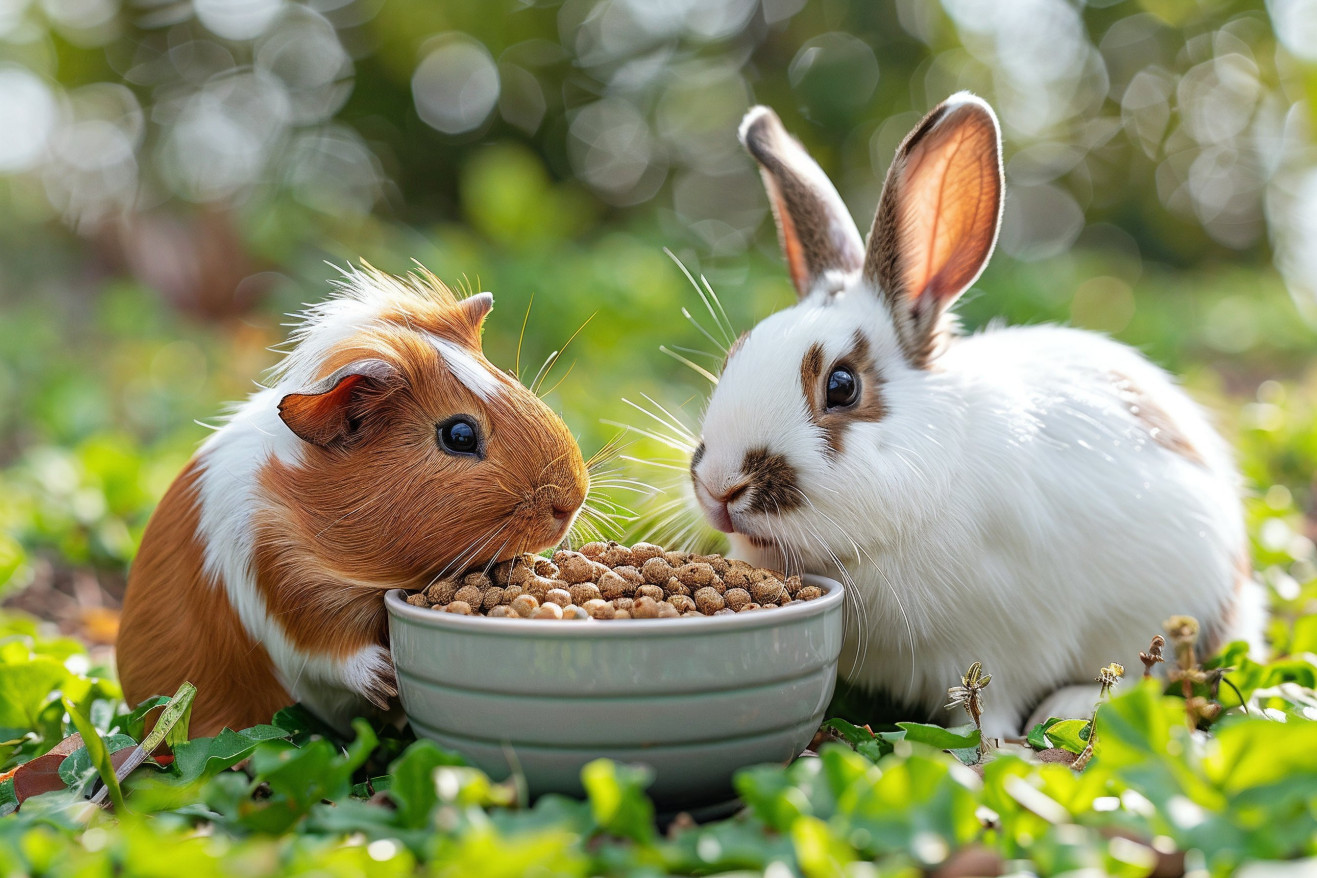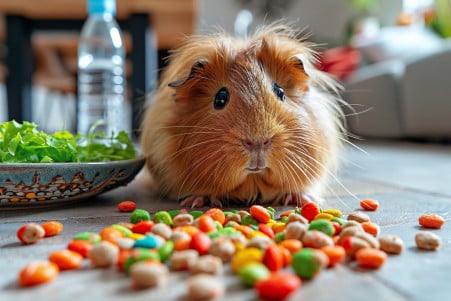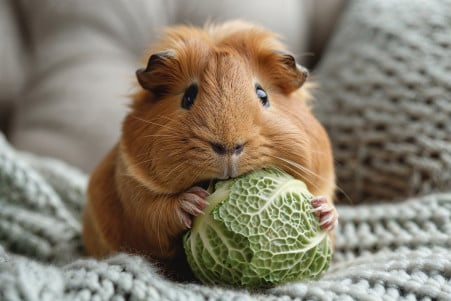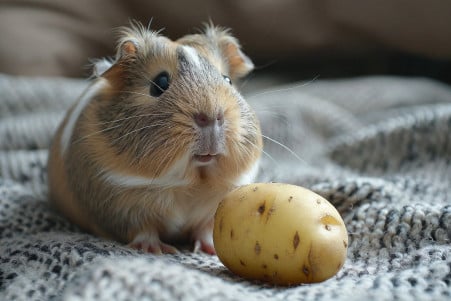Can Guinea Pigs Eat Rabbit Food? Nutritional Needs Explained
29 February 2024 • Updated 27 February 2024

If you have a rabbit and a guinea pig, you may wonder if you can feed them the same food. However, rabbit food is not a good choice for guinea pigs because it does not contain vitamin C, which is essential to their diet.
While rabbits can make their own vitamin C, guinea pigs need to get it from their food, so they need a diet that is specifically formulated to include this important vitamin and prevent deficiencies and other health problems.
In this article, we will take a deep dive into the nutritional needs of guinea pigs and rabbits, drawing on information from veterinary and animal nutrition studies. We will also discuss the role of vitamin C and other important nutrients in guinea pig nutrition to help you understand why rabbit food doesn’t cut it.
By the end of this article, you will know exactly what to look for in a guinea pig food to make sure your pet’s diet meets their nutritional needs and supports their health.
Can guinea pigs eat rabbit food?
How to Meet Guinea Pigs’ Special Dietary Needs
Knowing what guinea pigs need in their diet is especially important when it comes to their health, especially when it comes to vitamin C, which is an essential nutrient that guinea pigs cannot produce.
The Humane Society explains that guinea pigs need a diet that includes fortified pellet food, fresh veggies, and hay. To avoid scurvy, guinea pigs need 10–20 mg of vitamin C a day, according to Arizona Exotics. If a guinea pig is sick, they may need up to 100 mg of vitamin C a day.
The fact that guinea pigs can’t make their own vitamin C has important health consequences. A lack of vitamin C can lead to a number of health issues, including dry, rough hair, loss of appetite, and a weakened immune system.
NCBI Bookshelf explains that vitamin C is also important for collagen synthesis and wound healing. This is a key difference between guinea pigs and rabbits, whose food is not fortified with vitamin C, meaning that it doesn’t meet this need.
The composition of guinea pig food, as opposed to rabbit food, also meets guinea pigs’ unique high fiber and energy needs, which are important for their digestion and growth.
A diet that doesn’t meet these needs can lead to a lack of vitamin C, and it can also lead to long-term health problems, including dental and bone issues. This shows the importance of feeding guinea pigs a diet that meets their needs for essential nutrients to support their health.
What Is Scurvy and How Does It Affect Guinea Pigs?
Scurvy is the most common condition associated with vitamin C deficiency in guinea pigs.
Clinical signs of scurvy in guinea pigs include rough hair coat, dental pain, and poor wound healing.
According to a report by Veterinary Partner – VIN, even a mild deficiency in vitamin C can lead to a significant decrease in a guinea pig’s immune response, making them more susceptible to infections.
A study published in PubMed found that a severe deficiency in vitamin C can lead to the loss of blood vessel integrity, which is characterized by a reduction in important proteins like collagen and elastin that help maintain the structure of blood vessels.
These deficiencies can lead to other health issues beyond scurvy, leaving guinea pigs in a state of compromised health and less able to effectively fight off other health concerns. It’s important for owners to make sure their guinea pigs are regularly seen by a veterinarian to monitor their health and catch and treat vitamin C deficiency early.
Owners can help prevent these issues by feeding their guinea pigs a balanced diet that includes plenty of vitamin C and, if necessary, supplementing with vitamin C.
According to a report by the USDA, guinea pigs can get their daily requirement of vitamin C from specially formulated tablets or from fresh foods that are high in vitamin C. By being proactive about their guinea pigs’ diets, owners can help ensure their pets stay healthy and avoid serious conditions that can arise from nutritional deficiencies.
Impact of Poor Diets on Guinea Pigs
Feeding guinea pigs a diet that is not formulated for their specific needs, such as rabbit food, can result in serious health problems that can have long-term consequences due to nutritional deficiencies.
In addition to the well-known issue of vitamin C deficiency, poor diets can lead to a number of other health concerns. For example, the Merck Veterinary Manual notes that poor nutrition can lead to an increased risk of antibiotic toxicity and can also play a role in the development of diseases like scurvy and a variety of metabolic disorders.
Research has shown that there is a clear connection between diet and health in guinea pigs, with a lack of proper nutrition being associated with conditions like dental disease, gastrointestinal disorders, and skin issues.
A study published in the Journal of Animal Health and Behavioural Science stresses the importance of a balanced diet that is formulated specifically for guinea pigs, noting that there are risks associated with feeding practices that don’t take into account the particular dietary needs of these animals.
In order to promote the health of guinea pigs throughout their lives, it is important for pet owners to formulate diets that meet their needs in terms of fiber, protein, and essential nutrients.
A study published in PMC found that guinea pigs have a wide range of nutritional needs, which makes it especially important to understand their dietary requirements in order to promote their overall health and prevent disease.
It is important to make sure that guinea pigs get enough of certain nutrients, such as vitamin C, and that they get the right balance of others, such as calcium and phosphorus, to avoid long-term health problems.
Meeting the Nutritional Needs of Rabbits and Guinea Pigs
When we look at the nutritional makeup of rabbit food, it’s clear that it’s not designed to meet the needs of guinea pigs. Rabbits, as the Michigan State University Extension explains, need a diet that’s high in protein, carbohydrates, and fiber, which they can get from ingredients like alfalfa meal and wheat middlings.
While the formulation of rabbit food is based on their monogastric, herbivorous digestive system, it’s missing the one nutrient that guinea pigs need to stay alive: vitamin C.
On the other hand, guinea pigs need a diet that’s high in vitamin C, which means that the nutritional makeup of rabbit food isn’t meeting their needs.
What’s more, a study in ScienceDirect found that the nutritional content of commercial rabbit feeds often doesn’t meet the standards set by the Association of American Feed Control Officials, with the biggest differences coming in essential nutrients like crude fiber, which is important for both rabbits and guinea pigs.
This is especially important since, as the Journal of Exotic Pet Medicine points out, fiber is important for maintaining digestive health and preventing obesity in both rabbits and guinea pigs.
That said, while guinea pigs need a diet that’s high in fiber like rabbits, their protein and vitamin needs are very different, which means that rabbit food isn’t meeting their needs.
As a result, guinea pig owners need to look for other options, such as pelleted feeds that are supplemented with vitamin C, to make sure that their pets are getting the nutrition they need based on their unique physiological needs.
Fiber’s Importance in the Diets of Small Pets
Both guinea pigs and rabbits need fiber to support their digestive health. Supreme Petfoods explains that both animals need a diet that’s high in fiber to maintain a healthy gut and to prevent gut stasis, which is when the digestive system slows down or stops working.
Like rabbits, guinea pigs have teeth that grow continuously, and they need to eat a diet that’s high in fiber to keep their teeth from growing too long. Both animals can suffer from dental and digestive problems if they don’t get enough fiber in their diet.
That said, the type of fiber that’s best for each animal is different. Rabbits need mostly indigestible fiber to keep their gut moving, while guinea pigs need a combination of indigestible and soluble fiber.
A study posted on PubMed explains that the digestive system of a growing rabbit needs a mix of fiber components, including a minimum of lignocellulose and a maximum of digestible fibers. Guinea pigs need a similar balance, but their diet should also include vitamin C.
To make sure guinea pigs get enough fiber, pet parents should make sure they have unlimited access to high-quality hay, like Timothy Hay, and a nutritionally complete dry food that’s formulated for guinea pigs and is high in fiber.
By learning about the needs of their digestive systems and the importance of fiber in their diets, pet parents can help ensure their guinea pigs are healthy, which leads to bigger conversations about the overall health of these beloved animals.
Summary: Guinea Pigs and Rabbit Food
In summary, rabbit food does not contain the vitamin C that guinea pigs need to survive and thrive, and therefore it is not an appropriate diet for these animals. Unlike rabbits, guinea pigs cannot produce their own vitamin C and must get it from their food.
Without it, they can develop scurvy and other health problems, which is why it is so important for guinea pigs to have a diet that meets their specific nutritional needs.
This article has discussed the dangers of feeding guinea pigs a rabbit-based diet, which includes vitamin C deficiency and the problems that come with it. The long-term consequences of feeding guinea pigs a rabbit-based diet are dire and highlight the importance of feeding guinea pigs a diet that is tailored to their nutritional needs.
Pet owners who want to make sure their guinea pigs are healthy and live long lives should make sure their pets are getting the nutrients they need and consult with a veterinarian to make sure they are meeting their pets’ nutritional needs. A diet that includes the right amount of vitamin C, fiber, and other nutrients will help guinea pigs stay healthy when they are in the right hands.


